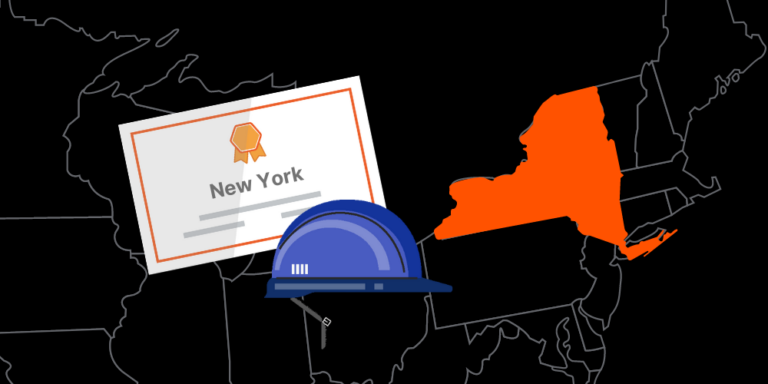

If you're starting a new construction business or looking to become licensed in New York for the first time, his guide will help you navigate the ins and outs of New York contractor licensing laws and regulations so you can stay above board. You’ll learn about who needs a contractor license, where they can get it, and some of the local municipalities that have additional requirements. Keep reading to learn more about getting licensed to do construction work in The Empire State.
Working in another state? For more information on licensing, check out The Ultimate Guide to Contractors License Requirements in Every State.
Table of contents
New York does not require most contractors to hold a license on the state level. There are only three types of contractors that need to carry a state license:
Asbestos contractors Crane operators Elevator contractorsAll of those licenses fall under the New York Department of Labor.
Many counties and municipalities in the state have their own contractor licensing requirements that construction businesses must meet to work legally. Below, we’ll go over a few in detail.
If you’re one of the types of contractors that require a state-issued license, here’s how you can go about getting them.
Any contractor engaged in the removal of asbestos is required to have a license to do so. This is less of a trade license and more of a universal license for any trade dealing in removal.
A lot goes into licensing for asbestos, and you can find the general guidelines here.
If you plan to run a crane operating business within New York State, everyone who operates a crane independently must carry a license issued by the Department of Labor.
Before a prospective operator can apply for the test, they must have three years of practical experience. Then, they’ll have a choice between six (technically five) licenses:
Class A - Unrestricted Class B - Hydraulic Class C - Boom Truck Class D - Restricted Boom Truck Class E - (Reserved) Class F - Line TruckYou can find more about these guidelines, as well as the application links, here on the Department of Labor website.
Contractors who work on elevators or accessibility lifts must hold an Elevator Contractor License. The application fee is $600, and the license is valid for two years.
Applicants must be able to prove:
General liability, personal injury, and property damage insurance with a $1 million dollar minimum per occurrence
Proof of current workers’ compensation insurance Proof of current disability InsuranceIn addition, the business must employ (or be owned by) a licensed elevator mechanic.
Free educational courses on Health & Safety, Data in Construction, and more. Earn Your Continuing Education Units (CEUs) for license renewals and career advancement with Procore.
![]()
Several counties within New York have their own requirements for contractor licensing. The following is a breakdown of those counties and the licenses they require contractors to carry.
As a note: New York State and its municipalities typically refer to contractors and trades as “home improvement contractors.” In general, this includes general contractors and any specialty contractor outside of plumbers or electricians.
Contractors starting businesses in Nassau County need to check with the Office of Consumer Affairs in order to stay above board with licensing. And it’s worth noting that almost all contractors need to carry a home improvement contractor license, including but not limited to:
General Contractors HVAC contractors Carpenters & cabinet makers Tile and marble installers Drywallers Masonry contractors Excavators Siding installers . and many moreThese contractors will have to request an application via email. The general requirements are as follows:
Complete application Supply passport photo Choose between business type Supply a copy of your driver's license Pay a $200 application fee Submit proof of insurance and workers' comp Pass a criminal background checkMaster Electricians and Master Plumbers have to complete an application with the Suffolk County Department of Labor, Licensing & Consumer Affairs.
To run an electrical business, you must have a master electrician on staff. While there are several other criteria to meet, you must have seven of the last 10 years of employment in the field. The same applies to plumbing contractors.
Similar to Suffolk County, Nassau requires licenses from just about every home improvement contractor. Licensing goes through the Department of Consumer Affairs.
These contractors are just a few of the trades that require a home improvement license in Nassau County:
General contractors Carpentry contractors Drywall contractors Garage Builders Masonry contracts Roofing contractorsAll of these trades have similar requirements they must meet, and they’re pretty stringent:
Notarized application Notarized disclosure from each of the company owners, partners, and even salespeople Two professional passport photographs for each of the owners Proof of residence in the form of a DMV-issued license A utility bill from the place of residence A copy of the business phone bill State all criminal convictions Provide all trade names, partnerships, and corporations Certificate of Insurance and worker’s comp insurance A Federal Employer Identification number For contractors that sub work, provide a list of all your subs along with their insurance.In addition to all those hoops you’ll have to jump through, the application fee for new applicants is $600. Download the application for a Home Improvement License here.
Westchester’s contractor licensing law requires that all home improvement contractors carry a license issued by the Department of Consumer Protection. While the county website is far from exhaustive, you can expect to have to meet similar requirements as Nassau and Suffolk counties.
Home improvement contractors will have to submit an application and meet some specific criteria in order to apply:
Submit a $500 check Provide proof of business name Detailed self-written work history of the applicant Notarized child support form from every partner Proof of insurance, as well as workers' compensation Professional passport photos Copy of driver’s license Current vehicle registrations for each decal requested (they are required)Plumbing and electrical contractors also need to seek licensing through Consumer Protection. To become a contractor, either you or someone you employ must carry a master-level license for either of these trades.
As of September 2023, the Plumbing & Mechanical Trades Board modified licensing requirements for Master Fire Sprinkler Installers and Master Fire Sprinkler Inspectors with regard to NICET certifications. License requirements are outlined by Putnam on their site.
Contractors must hold a license administered by the Rockland County Consumer Protection/Weights & Measures Department. To apply, home improvement contractors must fill out this application and provide:
Notarized proof of experience Child support certification A photograph of the owner (DMV-issued license will do) A business license Proof of insurance and workers' compensation Insurance documents Letters of reference from two or more people Current DMV registration for each vehicle used in business $325 application feeTo operate an electrical contractor in Rockland, you’ll need to hold or hire someone who holds a master electrician license. The applicant must have at least 7.5 years of experience and complete this application.
Contact the Department of Consumer Protection for more information on obtaining a master plumber’s license.
Subscribe to Blueprint, Procore’s free construction newsletter, to get content from industry experts delivered straight to your inbox.

There are a few municipalities that have their own requirements for contractor licensing.
The following is an overview of the regulations in New York City and Buffalo. Be sure to check with your municipality, as this list is far from exhaustive.
For a city of over 8 million people, home improvement contractor licensing isn’t terrible to navigate. Essentially, all home improvement contractors will have to contact the city’s Department of Consumer and Worker Protection (DCWP), fill out the application, and take an exam. Here’s what’s required:
Complete the basic license application Create a login and apply for licensing Provide sales tax ID number Provide proof of residency Provide proof of business address Provide proof of workers' compensation insurance Provide proof of EPA certification (for businesses that apply) Provide a copy of a surety bond Include a $50 exam fee and pass the Home Improvement Contractor Exam Have fingerprints taken and pay associated fees Pay licensing feeThe licensing fees work on a sliding scale, depending on what time of year you apply. They’re generally between $25 and $100, with an extended option costing $125.
Plumbing contractors must have a licensed master plumber on their payroll to operate within the city. Licensing for master plumbers is a function of the NYC Department of Buildings. Aside from the application and exam, the requirements are:
Must be 18 or older Read and write in English Be of "good moral character"Applicants must also meet one of the following requirements:
Have seven years of total experience in planning, design, and installation of plumbing systemsHold a bachelor’s degree in mechanical engineering or appropriate engineering technology and five years of experience
Hold a state-issued professional license as an engineer or architect and three years of experience Have seven years of experience with a government agency inspecting plumbing workElectrical contractors must also have a master-level license holder under their employment to contract within NYC. The Department of Buildings also controls electrical licensing. Aside from the application and exam, the requirements are:
Must be 21 years or older Read and write in English Be of good moral character Have at least 7.5 years of experience in the fieldApplicants must also meet one of the following requirements:
Hold a journeyman electrician license 2.5 years of experience for masters applicants 3.5 years of experience for bachelors applicants Graduate from a trade school and have 5.5 years of experienceAn appropriate combination of education and experience (somewhat subjective, so be able to back up this claim)
Have 7.5 of experience with a government agency inspecting electrical workBuffalo home improvement contractors must carry city-issued licenses. These licenses fall under the Department of Permit and Inspection Services. In addition to filling out this application, the steps to apply are:
Must be 21 years old or older Provide proof of name and residence of the business Provide proof of years the applicant has been engaged in the field Number of employees Proof of workers' compensation Proof of general liability insurance A statement of credit references of suppliers A sample of a contract template Copies of liens, judgments, or complaints outstandingPlumbing contractors must have a master-level license to operate within the city of Buffalo. While experience requirements aren’t explicitly listed on the department’s website, you can obtain more information from the Department of Permit and Inspection Services. Prospective contractors will have to fill out this application for licensing.
There aren’t any detailed requirements listed on the city’s website for electrical contractors, but you can reach out to the Chief Electrical Inspector for clarification on requirements.
Not only can you lose the rights to your payments if you work without a state-required license, but there can also be severe penalties, including criminal charges.
For instance, operating a crane while unlicensed is a misdemeanor, and it varies between Class A and B, depending on circumstances.
On top of state-issued licensing penalties, individual counties and municipalities can hit you with their own fees, civil penalties, and criminal charges.
Additionally, New York’s requirements for mechanics liens and licensing are crystal clear: If the work you’re doing requires a license, but you do not hold that license, you do not have a right to a mechanics lien. For that reason, it’s best not to test the mechanics lien and licensing laws in New York. Instead, make sure you meet all of the licensing requirements wherever you’re working to ensure you can protect your payments.